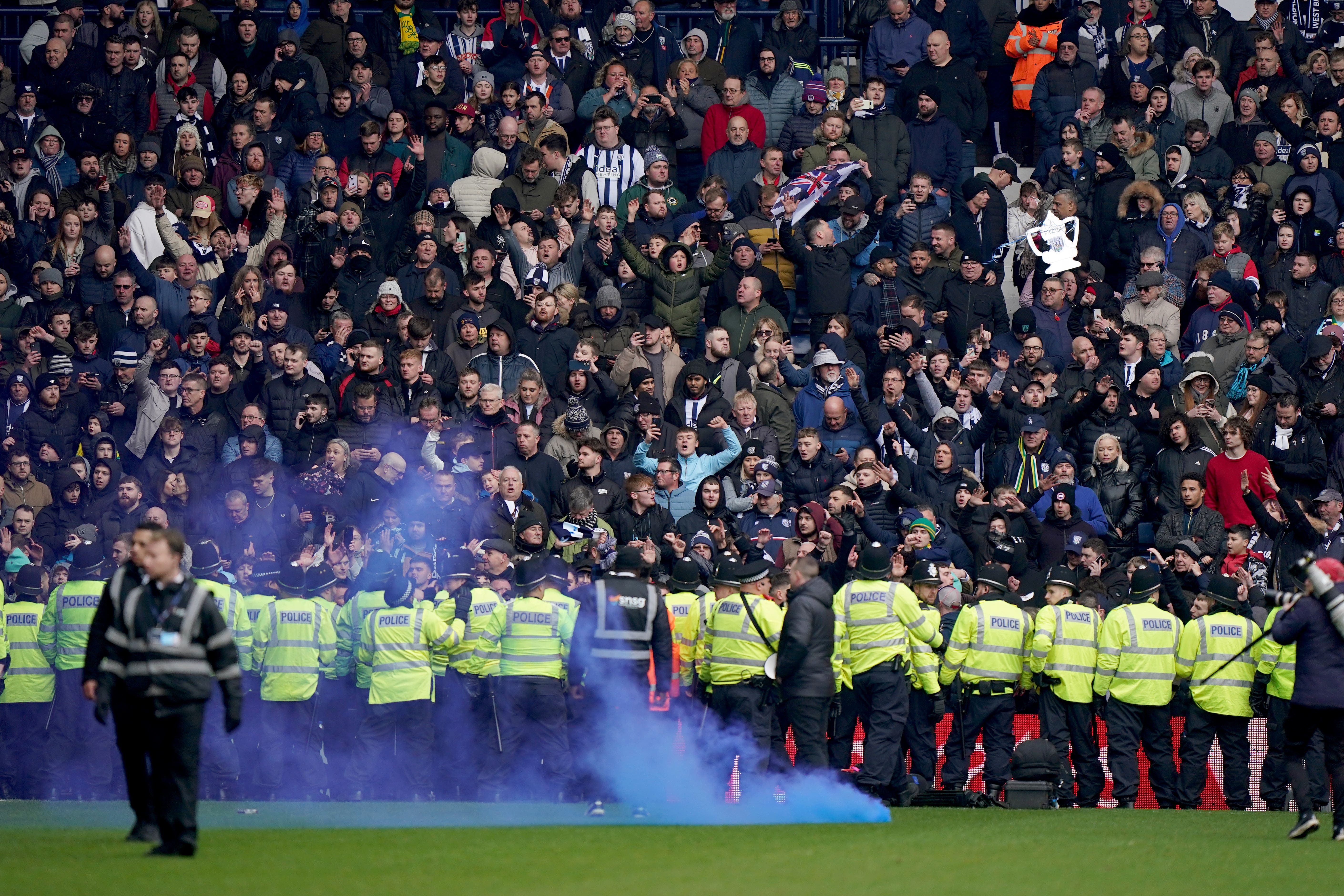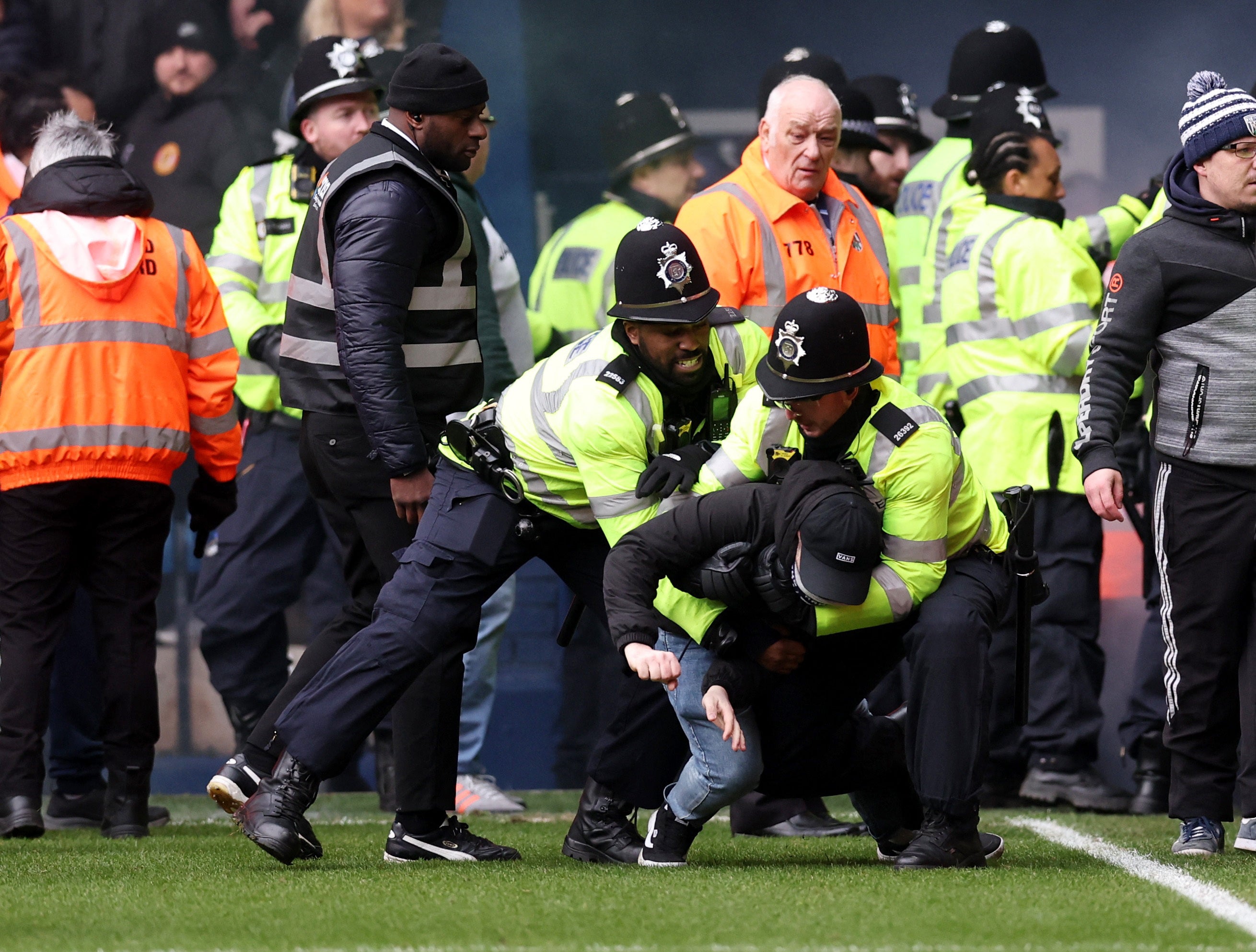Terrifying scenes at West Brom-Wolves are a warning for football
The picture which has since emerged is of a harrowing ordeal for those caught in the chaos at The Hawthorns on Sunday. Football must never be complacent when it comes to violence in the stands
When you start to piece together exactly what happened at The Hawthorns on Sunday, in the FA Cup tie between West Brom and Wolves, it makes a terrifying picture.
You may have seen the image of a bald man with blood streaming from a wound on top of his head, his face washed red. Fans appeared to chant “Let him die” as he was escorted away by police.
A ball boy required treatment after being hit by a missile. Children were rushed away from the violence, spilling onto the pitch to find safety. Disabled fans at the bottom of the West Stand were caught in the melee. Some involved were carried away on stretchers. Six people were arrested, as well as a 16-year-old before the match on suspicion of carrying a weapon. West Midlands Police have pledged to arrest many more.
The area was close to the West Brom players’ families, and some of them ran straight into the violence. Defender Kyle Bartley carried out his daughter and was later substituted so that he could stay with his children rather than finish the game. There were unconfirmed reports of players’ family members being spat at. To be caught near the violence must have been petrifying.
The Football Association is investigating, as are the police, to identify suspects involved and understand how something like this could have happened. It is thought the violence was sparked when a group of Wolves fans entered an area reserved for West Brom supporters and began celebrating their late goal. The FA Cup tie was suspended and eventually restarted, with Wolves winning 2-0.
It is worth pointing out that these kinds of scenes are now very rare in English football, certainly in comparison to 40 years ago. The 1985 Heysel Stadium disaster, in which 39 people died, led Uefa to ban English clubs from European football for five years and sparked government action to tackle hooliganism which had dogged the game through the 1970s and 80s.

Margaret Thatcher declared: “We have to get the game cleaned up from this hooliganism at home, and then perhaps we shall be able to go overseas again.” The 1989 Football Spectators Act, and later the 1999 Football Disorder Act, moved to stop convicted hooligans from attending matches.
It worked, at a time when the rise of the Premier League during the 90s further changed the landscape. Money washed into football, giving the game’s authorities the resources to tackle the problem, incentivised to protect an increasingly valuable industry. The Premier League is now an eye-wateringly lucrative global TV commodity and it pays to show a polished product.
In some ways, the FA Cup lends itself to potential acrimony, throwing together clubs from different leagues: these two old rivals hadn’t played in front of fans for 12 years (their two matches during the 2020-21 season took place in spectator-free stadiums due to Covid), adding a layer of tension. Cup rules mean 15 per cent of a ground’s capacity can be given up to away supporters, so more than 4,000 Wolves fans could attend the game, roughly double the usual away contingent at The Hawthorns.

There will now be punishments handed out. Several fans will probably be hit with football banning orders, at the very least. West Brom themselves will likely be sanctioned by the FA, which described the scenes as “completely unacceptable”.
Perhaps it was a one-off. But it should be a warning to football’s authorities that complacency is never an option. For all the English game’s commercial sanitisation, it still contains deep rivers of tribalism which have been flowing for decades. It still contains a small section of people who don’t know what to do with their fragile emotions.
All football’s foibles are really just a mirror of society’s – racism, sexism, violence – and they tend to come to the fore when the outside world gets harder. It is not an excuse but a reality that the economic environment is as chastening as it has been for several years in this country. Frustration often finds an outlet in football, and there is plenty more to go around.
Police responded quickly to eventually quell the chaos. But football must be very wary of repeats. This game was deliberately allocated an early kick-off to nullify day-time drinking; it was assigned extra police officers to handle the rivalry; and yet one of the darkest days in English football’s recent history still unfolded in a horrifying way.
Bookmark popover
Removed from bookmarks